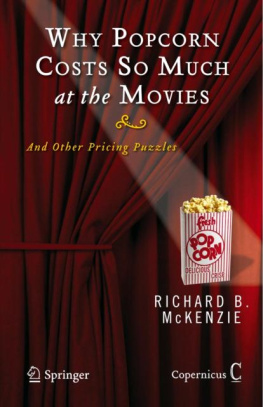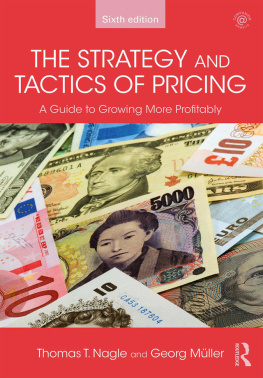Richard B. McKenzie




Preface
HOW PRICES MATTER
 rices are ubiquitous, so much so that their importance to the smooth operation of a market economy (even one constrained by extensive political controls as is the case in China) can go unnoticed and unheralded. Prices are what all trades, whether at the local mall or across the globe, are built around. They facilitate trades among buyers and sellers who don't know each other, meaning they make less costly, or more socially beneficial, the allocation and redistribution of the planet's scarce resources. Indeed, as the late Friedrich Hayek is renowned for having observed, prices summarize a vast amount of information on the relative scarcity and, hence, the relative cost of resources (with much of the information subjective in nature) that can be known only by individuals scattered across markets and cannot be collected in centralized locations, except through market-determined prices.'
rices are ubiquitous, so much so that their importance to the smooth operation of a market economy (even one constrained by extensive political controls as is the case in China) can go unnoticed and unheralded. Prices are what all trades, whether at the local mall or across the globe, are built around. They facilitate trades among buyers and sellers who don't know each other, meaning they make less costly, or more socially beneficial, the allocation and redistribution of the planet's scarce resources. Indeed, as the late Friedrich Hayek is renowned for having observed, prices summarize a vast amount of information on the relative scarcity and, hence, the relative cost of resources (with much of the information subjective in nature) that can be known only by individuals scattered across markets and cannot be collected in centralized locations, except through market-determined prices.'
Because they summarize, and largely hide from view of buyers, so much information spread among people throughout the world, prices can be puzzling. Why prices are what they are, and change for reasons that are obscured by a multitude of economic events that can extend backward in time and forward into the future, can be mysterious. Explaining many puzzling prices can be detective work that the modern-day Sherlock Holmes would surely find challenging.
But the national economic planners of the past failed to appreciate the mystery of prices. Instead, they saw prices as nothing more than tags on goods and services-$i.99 or $599-that could be dictated or declared with the stroke of administrative pens. All they thought they had to do was write out a few numbers. Voila! A Price. Professor Hayek received a Nobel Prize in economics in part for pointing out the fundamental error in national economic planning, that knowledge of what people want and are capable of producing in all of its various forms is nowhere known to anyone or any small group of planners. Once more, the myriad knowledge needed by planners to do their jobs is so enormous that it cannot all be absorbed by the planners themselves, even with the help of the most powerful computers (which economic planners in the former Soviet Union did not have).
So much relevant knowledge to the efficient operation of an economy is highly detailed, is local in nature, and is subjective, which means so much production and consumption-relevant knowledge cannot be known to outsiders, no matter how hard they try. To Hayek,
The economic problem is thus not merely a problem of how to allocate "given" resources-if "given" is taken to mean given to a single mind which deliberately solves the problem set by these "data." It is rather a problem of how to secure the best use of resources to any of the members of society, for ends whose relative importance only these individuals know. Or, to put it differently, it is a problem of the utilization of knowledge not given to anyone in its totality.'
The only way this vast knowledge can be revealed is to give the people who possess knowledge the right incentives to make use of what they know and to communicate what they know to all relevant others through the pricing system.
Fundamentally, in a system where the knowledge of the relevant facts is dispersed among many people, prices can act to coordinate the separate actions of different people in the same way as subjective values help the individual to coordinate the parts of his plan ...The mere fact that there is one price for any commodity-or rather that local prices are connected in a manner determined by the cost of transport, etc.-brings about the solution which... might have been arrived at by one single mind possessing all the information which is in fact dispersed among all the people involved in the process.'
Buyers need not know the relative scarcities of myriad resources or the considerable intricacies of producing goods as simple as a pencil or as complex as a computer. The late journalist and market advocate Leonard Read penned a wonderfully brief but insightful essay, "I, A Pencil;' on how unexpectedly complicated the production of pencils is.4 As a consequence, Read argued that no one in the world knows how to make a pencil, at least not totally from scratch. Yet, tens of millions of pencils are produced each year for world consumption. The miracle of pencil production is guided by the forces of market competition-and market-determined prices.
To determine what they want, all buyers have to do is compare prices, along with the features, of alternative goods. Prices, in other words, economize on the knowledge buyers need to have to make tolerably informed purchases. Again, in Hayek's words,
The most significant fact about this [pricing] system is the economy of knowledge with which it operates, or how little the individual participants need to know in order to be able to take the right action. In abbreviated form, by a kind of symbol, only the most essential information is passed on, and passed on only to those concerned. It is more than a metaphor to describe the price system as a kind of machinery for registering change, or a system of telecommunications which enables individual producers to watch merely the movement of a few pointers, as an engineer might watch the hands of a few dials, in order to adjust their activities to changes of which they may never know more than is reflected in the price movement.'
In facilitating trades, prices can extend the scope of markets. In doing that, prices allow people to move away from self-sufficiency and narrow the scope of things they do, thus enabling people everywhere to reap the benefits of specialization. And an expansion of markets can result in greater competitive pressures for producers to become ever more cost-effective in production.
Most people intuitively grasp that product innovations, largely unfettered by government controls, can improve human welfare. Apart from the products to which they are associated, prices, too, can be innovative (as shown throughout this book) and can contribute to the growth in human welfare-until someone takes a page from the training manuals of economic planners of the past or gets the not-so-bright idea that they know better than markets what prices should be and that prices should be controlled by governments.
Back in August, 1973 President Richard Milhouse Nixon realized that the federal government could no longer control the price of gold at $35 an ounce. So he freed gold, leaving its price to be determined by unfettered market forces. Then what did he do? Something inexplicable, given his admission that the government could no longer control the price of a single commodity. He froze the prices of everything else-gazillions of goods and services-in the economy. Why? Because the inflation rate had reached a staggering (for the times) 3.76% for the previous seven-plus months of 1973. The result was an economic mess, and a recession-caused partially by people wasting time sitting in their cars in notoriously long lines at gas stations and by people having to adhere to silly rules only bureaucrats could love when people could fill their gas tanks. Several years later, President Gerald Ford thought he could beat back the upward price spiral of the 1970s by passing out (what else?) "WIN" buttons (for "whip inflation now"). Readers who lived through the WIN program understand that the buttons constituted a waste of valuable resources. The button's only effect on prices was to drive up the price of the metal used in them. Sloganeering will never cure inflation, or the high price of anything. The market forces behind prices are simply too powerful.














 rices are ubiquitous, so much so that their importance to the smooth operation of a market economy (even one constrained by extensive political controls as is the case in China) can go unnoticed and unheralded. Prices are what all trades, whether at the local mall or across the globe, are built around. They facilitate trades among buyers and sellers who don't know each other, meaning they make less costly, or more socially beneficial, the allocation and redistribution of the planet's scarce resources. Indeed, as the late Friedrich Hayek is renowned for having observed, prices summarize a vast amount of information on the relative scarcity and, hence, the relative cost of resources (with much of the information subjective in nature) that can be known only by individuals scattered across markets and cannot be collected in centralized locations, except through market-determined prices.'
rices are ubiquitous, so much so that their importance to the smooth operation of a market economy (even one constrained by extensive political controls as is the case in China) can go unnoticed and unheralded. Prices are what all trades, whether at the local mall or across the globe, are built around. They facilitate trades among buyers and sellers who don't know each other, meaning they make less costly, or more socially beneficial, the allocation and redistribution of the planet's scarce resources. Indeed, as the late Friedrich Hayek is renowned for having observed, prices summarize a vast amount of information on the relative scarcity and, hence, the relative cost of resources (with much of the information subjective in nature) that can be known only by individuals scattered across markets and cannot be collected in centralized locations, except through market-determined prices.'